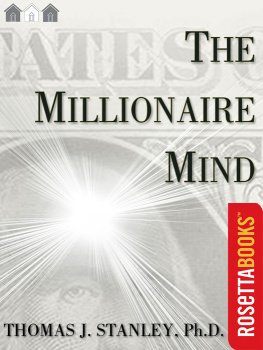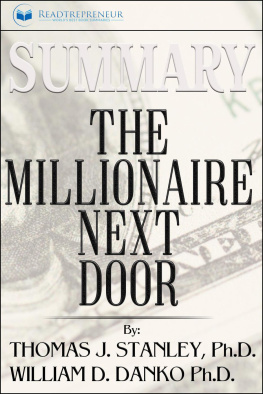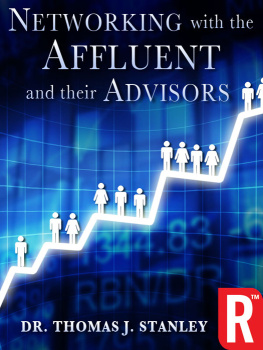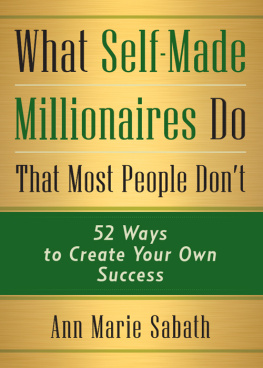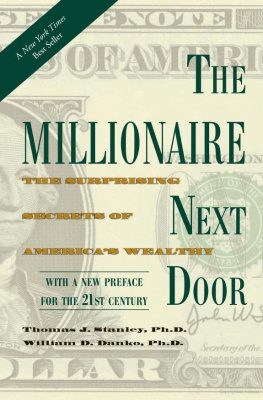All rights reserved. No part of this book may be used or reproduced in any manner whatsoever without written permission except in the case of reprints in the context of reviews.
This publication is designed to provide accurate and authoritative information in regard to the subject matter covered. It is sold with the understanding that neither the author nor the publisher is engaged in rendering legal, investment, accounting, or other professional services. If legal advice or other expert assistance is required, the services of a competent professional person should be sought.
Electronic edition published 2010 by RosettaBooks LLC, New York.
ISBN e-Pub edition: 9780795314834
Contents

Appendix 1:
In Search of the Balance Sheet Affluent
Appendix 2:
Businesses Owned and Managed by Millionaires
(National Geodemographically Based Sample)
Appendix 3:
Businesses Owned and Managed by Millionaires (Ad Hoc Sample)
Tables
Acknowledgments

Most importantly I acknowledge my wife, Janet, for her guidance, patience, assistance, and unselfish support for this project. Without Janet, this book would never have been written.
I greatly appreciate the contributions of my children, Sarah and Brad, in their roles as research assistants for this project. Sarah did all of the computer analysis for the ad hoc survey. Brad participated in the coding and tabulating processes of this data.
A very special thank-you is in order to my editor, Christine Schillig. She is a total professional with a very keen eye for the critical concepts. Chris sets a very high standard for excellence in editing. I also appreciate the many contributions made by Tom Thornton, President of Andrews McMeel Publishing. His continuing interest in The Millionaire Mind throughout its development was a great source of encouragement.
It is with great pleasure that I acknowledge the significant contribution made by the Survey Research Center, Institute for Behavioral Research, University of Georgia in collecting and tabulating the geo-based survey data for this book. Special praises are in order for Dr. James J. Bason, Director of the Survey Research Center, and for the fine efforts of his staff, specifically: Linda J. White, Kathleen J. Shinholser, Zelda R. McDowell, Mary Ann Mauney, and Cindy Burroughs.
A special thank-you is accorded to Beth Day for her assistance in conducting several of the interviews for the case studies.
I am indebted to Bill Marianes of Troutman Sanders for his extraordinary expertise in representing me.
Acknowledged also are the fine efforts of Ruth Tiller in word processing several versions of the manuscript, David Knapik for his excellent job of number crunching, and Art Gifford for his efforts in computing untold present values and sorting out the maze of economic opportunities.
I am deeply grateful to Dr. Molly S. Yelnats for her sage advice, encouragement, and support throughout this undertaking.
1

An Introduction to
the Millionaire Mind
T HEY LIVE IN LOVELY HOMES LOCATED IN FINE neighborhoods. Balance is their approach to life. They are financially independent, yet they enjoy lifethey are not all work, no play type of people. Most became millionaires in one generation. Neither their lifestyle nor their wealth was generated from being highly leveraged financially. They are not credit junkies. How did they accomplish this? How did they balance their need to become wealthy and economically productive with their need to enjoy life? They have the millionaire mind.
Early in my career of studying wealthy people, I had a glimpse of this segment of the millionaire population. In 1983 I was asked to interview sixty millionaires from Oklahoma. What I learned from them was simple, yet the message had a lasting impact on me: You cannot enjoy life if you are addicted to consumption and the use of credit. These Oklahoma millionaires were just the opposite, as demonstrated by one focus group of ten. All ten were seasoned business owners, executives, or professionals. All were first-generation wealthy. Some were credit-dependent earlier in their careers, but they eventually saw the light. They went cold turkey, breaking the cycle of borrowing to consume, earning to consume, and borrowing more and more money. Others never became addicted to credit or the need to display their success.
All ten were multimillionaires. They lived in fine homes in well-established, older neighborhoods. They drove American-made motor vehicles. They enjoyed life. They were not workaholics. They spent a lot of time with their families and friends, borrowed little money, and became wealthy, in most cases, before they were forty-five years old. My interview with this group was scheduled to last about two hours, but it actually went on for nearly four hours. I only had to ask a few questionsthe members enjoyed telling their own stories about becoming wealthy. If there were a Focus Group Hall of Fame, all ten of these millionaires would be inducted during the first round.
There were many important points made about how one can become an economic success, but one statement was riveting. It was made by Gene. He mentioned that those who are credit-dependent are in fact controlled by someone else, some institution.
Gene was in his late forties at the time. He listed his occupation as owner of a salvage business. He purchased or salvaged real estate from various financial institutions. These institutions have loans that are in default six months or more.
Just a few weeks prior to the interview, Gene salvaged sixty-eight homes, a commercial shopping center, and five multifamily apartment complexes from a financial institution with which hed had many previous dealings. Immediately after the deal was signed, the senior credit officer of the institution signaled to Gene and walked with him over to the large window in the officers top-floor office. It was a tall buildingthey could see for miles and miles. There were thousands upon thousands of commercial buildings all around. Gene could even see some of the residential neighborhoods on the horizon.
As he looked out the window, the officer pointed to all the buildings, homes, offices, garages, shops, and so on, and said the words that made a lasting impression on Gene:
We [the lenders] own it all all of it. The business out there? You [borrowers] just run these businesses for us. You guys run them for us, the financial institutions.
How many people today in America run their businesses, their professional practices but actually work for or are being controlled by lenders? How many live in luxury homes yet work hard to make payments to the ultimate owner of the mortgage? How many people take care of autos they lease from the real owner? Too many. But Gene is not among them, nor were any of the other members of his focus group. All possessed the millionaire mind. None had a private credit officer doling out cash. All lived in fine homes, but not one had a jumbo mortgage.
The lesson I learned from Gene was repeated many times over by the millionaires surveyed for this book. They all have the millionaire mind, yet they believe its possible to enjoy life and still become wealthy. They believe that financial independence and much economic success can be achieved without adopting a Spartan lifestyle. But there must be certain constraints, as discussed later in this book.

